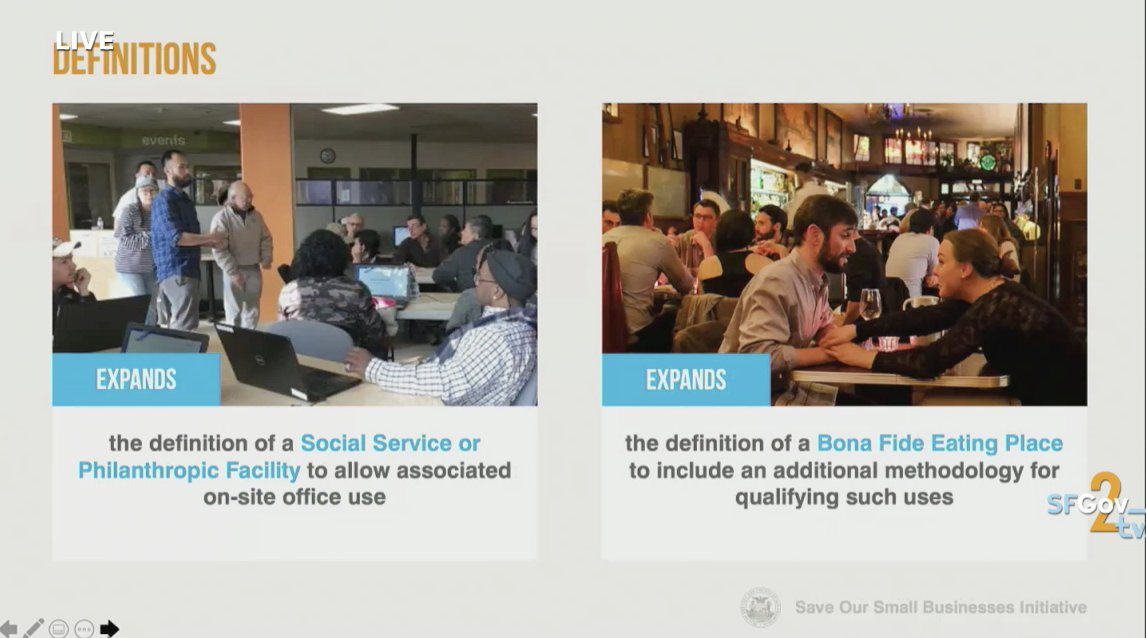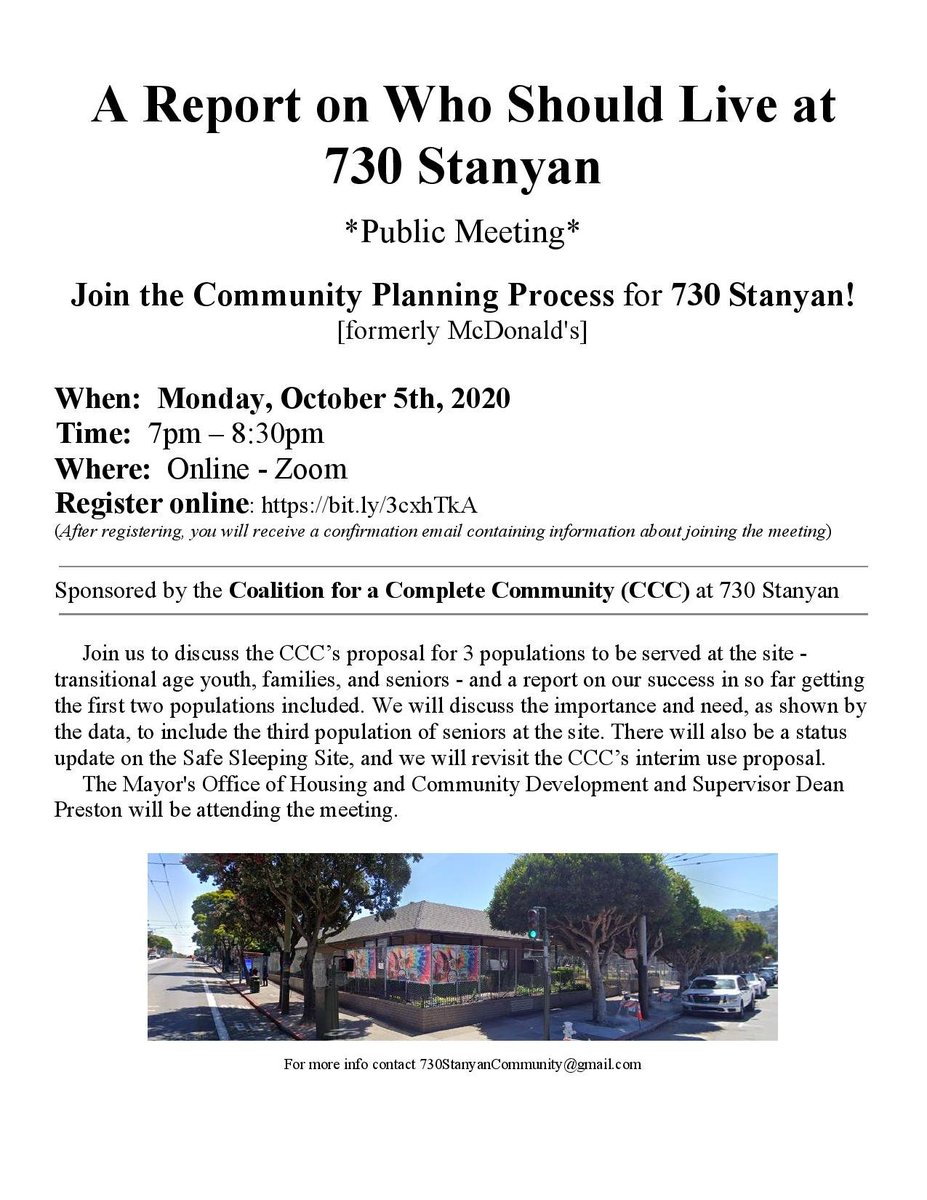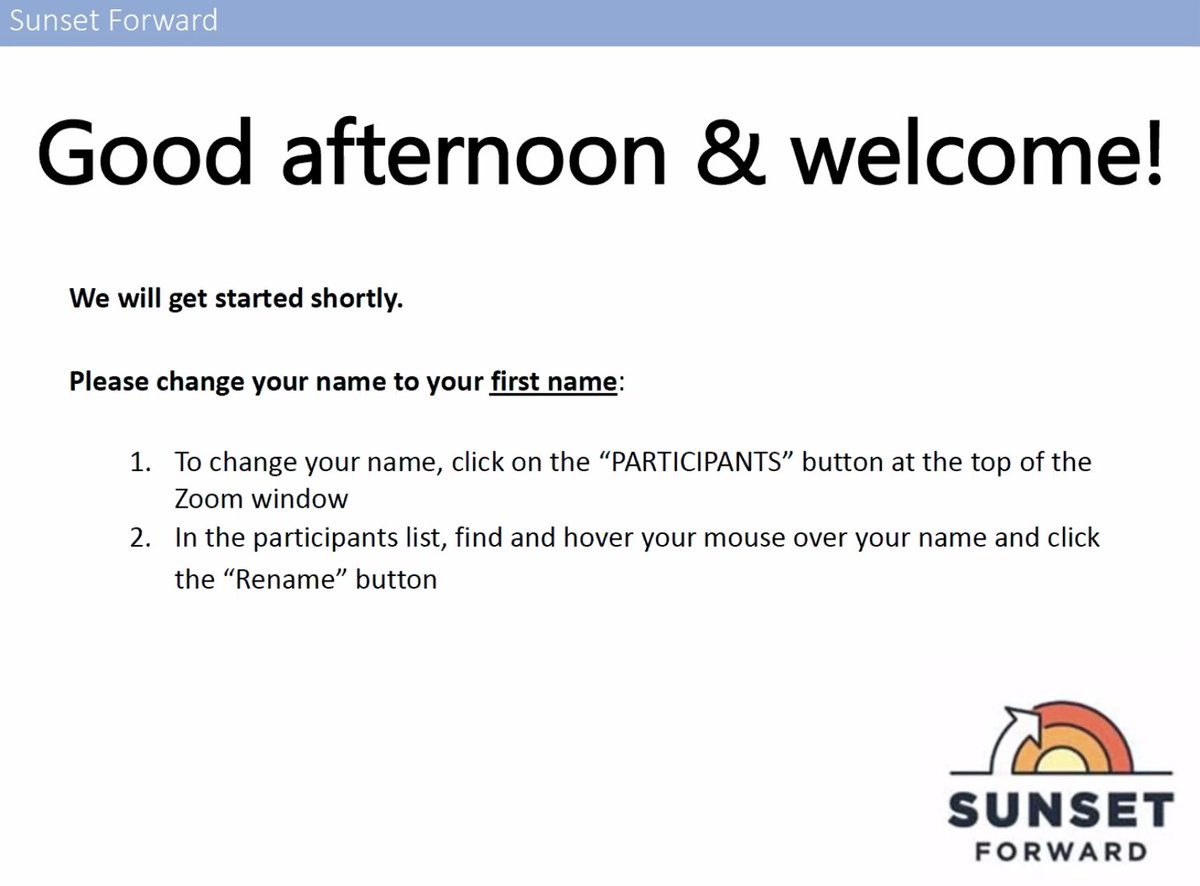
Hello San Francisco. I'm attending a Planning Commission meeting to watch a presentation by Planning Department about Prop H, which voters approved on November 3.
commissions.sfplanning.org/cpcpackets/202…
commissions.sfplanning.org/cpcpackets/202…

We're on a preceding item, which is a review of land use events at the Board of Supervisors and other boards/commissions. Planning Dept representative Aaron Starr notes that the Whole Foods approved by the Planning Commission in June was subject to a CEQA appeal on Tuesday.
Starr reports that the CEQA appeal was approved because the loading traffic for the Whole Foods was underestimated, since the Planning Commission found that the air quality impacts from loading would fall within acceptable levels.
Starr notes that the CEQA exemption was originally a Class 32 exemption for infill development, but that exemption was changed to a common sense exemption after the conditional use authorization because the site is on the Cortese list for parcels needing environmental cleanup.
We're now moving onto the Prop H presentation item.
Aaron Starr is providing background. After shelter-in-place started in March, the Mayor approached the Planning Dept and asked for Planning Code amendments to help small businesses. 

Starr: Identifying code changes was easy. Any small business owner knows that changes require months of waiting. Prop H removes many but not all of these barriers.
Starr: The bill gives deferences to communities of concern like the Mission and SOMA by exempting them from many of the changes.
Planning Dept staffer Bridget Hicks now covering the city-wide changes. Planning will work with DBI, Fire, etc. to make changes to planning processes. And restaurant service will be allowed in parklets. Changes can only be liberalized within the 1st three years. 

Neighborhood notification has been disallowed in commercial corridors. And restrictions on specific zoning uses have been removed in commercial corridors. 

Temporary uses are now allowed in bars and entertainment venues without causing these businesses to lose their normal permits. They can later go back to their original use. And pop-up retail can go into vacant storefronts, not just occupied ones. 

Hicks: It used to be difficult to figure out the uses allowed for corner stores. They now allow NC-1 zoning uses. And conditional use authorizations are no longer required for patios for restaurants—bars are excluded. 

Social services are now allowed to operate commercial corridors. Previously that was only allowed as an accessory to the services provided. 

Hicks: "We expect a lot more projects to quality for over-the-counter review." And Prop H "will greatly reduce the timelines for [small] businesses." We're working to implement the 30-day review process. 

More uses are now allowed outdoors, notably dining. There's also some retail use. And they may make it possible to allow education uses. 

There have been over 2,400 applications. Most are for outdoor dining. There's also a question of winterization for Shared Spaces. They're working on updating guidelines for making spaces habitable in the winter months. 



Ocubillio: A survey of merchants showed that 80% are willing to operate a Shared Space year-round.
In October Mayor Breed announced that the program will become permanent. We will be working with stakeholders on upcoming legislation. 

We're now going to public comment on this item.
First speaker: What is Planning doing to implement the vacancy tax, as well as neighborhoods with many tourist businesses?
Peter Papadopoulos from MEDA: We appreciate the engagement with the authors of the bill. This measure applies broadly to the Mission. One part with zoning tables is excluded. We want small businesses to take advantage of the permit speedup portions of the bill.
Papadopoulos: We all agree, Mission St is not a good target to turn into another Valencia St. We want Prop H to roll out in a healthy and equitable way.
An organizer in the Mission is calling in: Prop H will help some small businesses, but the "one-size-fits-all solution" will hurt the uniqueness of cultural districts in SF. We're happy that City officials are willing to work with the community to help the Mission.
Carlos Bocanegra: Prop H will hurt the Mission. It unintentionally undermines protections for cultural communities. Many family businesses, taquerias, etc. won't have the technical expertise to take advantage of it. Let us admit that it will have unintentionally racist impacts.
Luis Avalos from SF Latinx Young Democrats San Francisco is here: The club declined to endorse. We think that residents should be allowed give feedback on permits. And Prop H could allow offices to creep into the Mission and Chinatown. We need legislation to resolve these issues.
Another member of Latinx Young Democrats: Neighborhood commercial districts were created in the 1980s due to proliferation of bars and restaurants. We're seeing laundromats close across SF. These businesses serve low-income communities. We need incentives to open more.
A rep from Redstone Labor Temple is here: We oppose Prop H. Language preferences people in tech or people who are able to handle technical business work. We're worried about Latinx businesses and don't see Prop H as being helpful.
Sharky Laguana from Small Business Commisison: I've been listening to the public comment and want to acknowledge shared concerns about possible negative impacts. But I've heard from many businesses unable to navigate regulations.
Laguana: And Prop H helps sustains restaurants which need help. On balance, it's extraordinarily helpful. I look forward to working with you.
Just gave public comment.
Co-founder of Latinx Young Dems is here: It currently takes around 3 months just to get a meeting with DBI. Skeptical of ability to change this. And why are parklets allowed for restaurant use? Prop H is an experiment. We need monitoring for Prop H impacts.
Public comment is closed.
Commissioner Fung is asking about the over-the-counter permits: Is there an avenue where businesses can get permit approval right away?
Planning: Currently not immediately. Permits are dropped off due to COVID-19 precautions.
Planning: Currently not immediately. Permits are dropped off due to COVID-19 precautions.
Commissioner Tanner: 30 days for permits sounds great, but difficult to implement. I know there's a task force being formed. I'm curious how we are going to meet the 30-day goal.
Bridget Hicks: We've already been working with other agencies, mainly DBI because they start the permit process, to find ways to expedite the process and separate the applications. Next month we'll focus on hitting he 30-day goal.
Tanner: It'd be great to explore online applications, although I know there's growing pains in implementing that, so it's no silver bullet. I have confidence you'll figure out. I'm glad to see agencies are working together. And are there any plans to iterate on Prop H?
Aaron Starr: Normally changes must be approved by voters. But this bill says the Board can liberalize Prop H within 3 years, and then restrict the changes after that.
Tanner: What kind of data do you want to track each year on equity and implementation?
Starr: We're working on identifying the things we want to track with our data team.
Tanner: Will enforcement protocols for noise limits stay the same?
Hicks: Yes, and that applies to entertainment uses.
Hicks: Yes, and that applies to entertainment uses.
Starr on the data question: With regards to Shared Spaces, we also ask optional questions in the application about identity. We want to see which communities are being served by applicant businesses.
Department head Rich Hillis: We'll be prepared to make adjustments based on how Prop H is working. This is something we've been exploring.
Commissioner Diamond: The Shared Spaces program may be one of the only good things to come out of the pandemic. The map for applications was shown briefly. It seems as though few retail applications come from the southeastern portion of the community. What're we doing about that?
Ocubillo: Equity program has been a key part of the program. We see it as an opportunities to address structural inequities exacerbated by the pandemic, with technical assistance , design support, and a grant portal which is coming next week.
Ocubillo: Shared spaces are dense in other places, reflective of structural inequities where places are invested in and connected to transit. We're targeting equity communities for support.
Diamond: What are we doing about restaurants where a shared space is not physically possible?
Ocubillo: Shared spaces do have limitations as a strategy, which is why we need a range of tools, like Prop H. We've closed some streets where shared spaces aren't possible.
Ocubillo: Shared spaces do have limitations as a strategy, which is why we need a range of tools, like Prop H. We've closed some streets where shared spaces aren't possible.
Diamond: How do we ensure that restaurant customers are six feet apart while dining?
Ocubillo: It's a deep interdepartmental partnership around complying with public health, ADA, and emergency access requirements. We have an ambassador team which talks to operators.
Ocubillo: It's a deep interdepartmental partnership around complying with public health, ADA, and emergency access requirements. We have an ambassador team which talks to operators.
Ocubillo: If issues persist, we have an escalation process. E.g. if an entertainment use becomes rowdy, we can escalate through Entertainment Commission.
Commissioner Imperial: How are we helping businesses with grants? What does a space cost?
Ocubillo: Board of Supervisors has allocated $0.5M. And there will be $2.1M of grants for furnishings and technical assistance with issues like management. Space cost is around $20K.
Ocubillo: Board of Supervisors has allocated $0.5M. And there will be $2.1M of grants for furnishings and technical assistance with issues like management. Space cost is around $20K.
Imperial: It still sounds like businesses will be spending $10K–15K out-of-pocket.
Imperial: And many cultural districts are struggling with technical knowledge to set up businesses. I hope OEWD will take that into consideration. And how will shared spaces become permanent in the context of Prop H? What legislation is coming?
Ocubillo: Shared spaces are dense in other places, reflective of structural inequities where places are invested in and connected to transit. We're targeting equity communities for support.
Imperial: Prop H doesn't prioritize cultural districts. I think we should commit to technical assistance in cultural districts. And one caller talked about pre-COVID-19 vacancies and specific commercial corridor uses. How do we balance those?
Hicks: The idea is to make more permits over the counter. We're looking into all the ways we can track changes of use that happen over-the-counter.
Imperial: On Ocean Ave there are many commercial vacancies. What does success look like, especially with the vacancy tax?
Hicks: The Board of Supervisors has paused the vacancy tax due to concerns about businesses and landlords going out of business.
Hicks: The Board of Supervisors has paused the vacancy tax due to concerns about businesses and landlords going out of business.
Hicks: With regards to success, we want to remove barriers for small businesses.
Commissioner Moore is now asking some questions, but I have to get going now. Thanks for reading.
• • •
Missing some Tweet in this thread? You can try to
force a refresh














